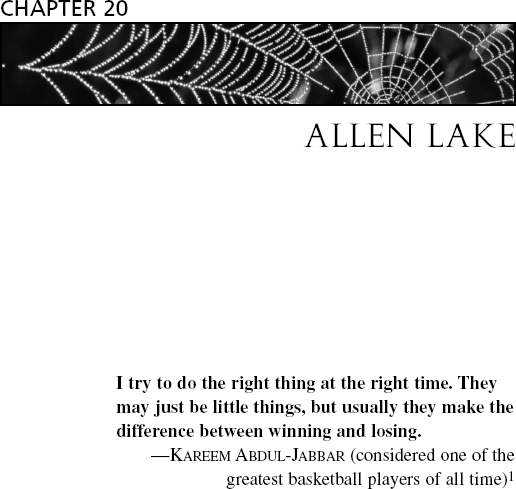Finding Allen Lake takes work.
First you check out the tan apartment building on the outskirts of Delta, knocking on doors answered by weary women who stare when you ask for Allen Lake.
So you walk randomly into stores and restaurants—Delta is a small town, after all—asking after Allen Lake. You come back, day after day, talking to people, getting little clues. I saw him yesterday, down near Curley's. At the Loft. At the Chevron station. At J. J.'s.2
Finally, you drift by Lake's apartment building again, trying to guess which one of the four clustered apartments in front of you might be Lake's, when a couple of teenagers pull up in a Chevy pickup.
The girl gets out first, slams the door. The boy follows—the slim frame of youth, baseball cap turned backward. They stand a bit away from you, focused on each other. “Dad!” says the girl.
The man turns questioningly to you, as much to get out of the argument as to find out who you are. You look closely. The boy is actually a man, maybe forty-five, good looks still apparent behind the pugilist's nose. His thatch of hair is bleached gold—even his pale blue eyes seem bleached.
“I'm looking for Allen Lake,” you say.
Long pause. Finally, “You're looking at him.”3

J. J.'s, as it turns out, is set well back from the road in a squat, neatly built 1940s-style box home with a large sign over the front porch: DELTA.
Inside, glass cases of antique teacups and 1950s toys line the walls. Faded Oriental carpets cover the hardwood floors. Pool players pause their game to stare silently at Lake. “It's okay,” Lake reassures them.
Lake steps up onto a shag carpet stoop at the bar and pours himself a drink. For his visitor, he pulls out a gallon jug half full of rosé, blows the dust off the top, and pours a glass.
“I met Carole when we worked at the cheese plant,” he says. “She was always bringing me sandwiches and the like. She was a hippie sort of flower child—like she was straight out of the seventies. Flowing dresses and such.”
He pokes at the varnish on the wooden bar. “She was just a great human being, you know. Very good mother.
“She would do stuff for me all the time. I'd come home and she'd be cleaning my house. She painted my derby car. She was a good artist—real good.
“Got to be like she was stalking me,” Lake continues. “She didn't want to go home. Once she gave me a pair of sex handcuffs. She used to say—God, I'd love to make love to you right here, right in the cheese vat.”
Lake grimaces. “But she was a good mother—a real good mother. People used to call her the Lizard Lady. She had this thing about lizards, snakes, and such. Even the seat covers in her Jeep had lizards on them.
“She'd talk about Marty sometimes. How he beat her. She'd tell everybody, ‘You want to see my bruise?’
“She'd have done anything for me. Kept making me things. A big quilt. Curtains. If I needed a hundred bucks, she'd lend me a hundred bucks. She was coming on to me. But I'd tell her, look, you're married now.
“I'll be honest with you, if Carole had been drop-dead gorgeous, it wouldn't have mattered a bit if she was married. But she was an awesome person. I didn't want to make her feel bad, you know? By telling her she wasn't my type.
“Marty was an okay guy. I never saw him hit her or anything like that.”
When asked what happened the night of Marty's death, Lake pauses.
“After work, a few other guys and I got drunk out at the lake. Filthy drunk. We were having a good time. Got a little loud. A little rough. Marty ended up on the road in front of the house. Just lying there. Somebody called Carole. She came with her Jeep—picked him up and shoved him right in it, took him back home.
“I went to bed. She came back over for a while. Drank some orange juice, I guess. Then she left again. The next morning she came back. I was in the shower. Came out, had a towel on. She looked funny. Real funny. I said, ‘You look bummed. Where's Marty?’
“Her eyes just looked empty. Black. Spooky. That's when I realized it. She'd killed Marty. She wanted to tell me. I was freaked out that she told me. I told her to call the police—and if she didn't, I would.
“You know the rest.” Allen spreads his hands and gives a sad grin.
